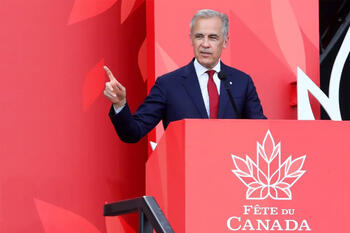
When globalism was hot, then-prime minister Justin Trudeau tried to be hotter by deciding that Canada has “no core identity, no mainstream,” and suggesting Canada had become a “post-national state.” Now that nationalism is back in vogue, Prime Minister Mark Carney, unwilling or unable to counter U.S. President Donald Trump’s taunts and tariff barrage, has become an odd recipient of Canada’s quest for a U.S.-like national identity. Even as he rails against America’s temperamental chief executive, he has shown little interest in curbing his country’s own protectionist policies.
But Canadians, indulging in a rare burst of nationalist authoritarianism, may be jumping on the wrong train. Even as people reject globalism, the “national state” is also losing its appeal — not only in the United States, but throughout Europe and the United Kingdom, as well. Some of this, on the left at least, reflects anti-western ideology, epitomized by DEI and the mandatory acknowledgement of First Nations land rights, which are now deeply entrenched in the education systems of the U.S., Canada and Europe.
Support for a highly centralized state also represents a rejection of Canadian and American attempts to balance national and regional concerns. As enormous countries, we each have populations that have predominately different origins and exist in often wildly different economies. A suburbanite at the edge of the Golden Horseshoe or in the endlessly expanding sprawl north of Dallas has very different ideas and priorities, whether in terms of schools or support for terrorism, than an arts or non-profit worker in central Toronto or Manhattan.
The differences get greater when you look across the continental expanse. Alberta and the Prairie provinces depend on raw material production, which is not exactly in line with Carney’s ultra-green vision, as Conservative Leader Pierre Poilievre has rightly pointed out. British Columbia inhales new urbanist dogma and seeks to reduce fossil fuels, and Ontario remains divided between its industrial base and its greener-than-thou urban elites. Like them, Carney seems more focused on things other than finding ways for Canada’s various communities to thrive.
But more power to the provinces or the states does not really go far enough. For most things, outside of national defence and foreign relations, the real goal should be to bring decision-making down to as local a level as possible. This notion is popular among Canadians, most of whom wish to see decisions made closer to home.
This notion is also embraced in the U.S., notes Gallup. Big companies, banks and media receive low marks from the public, but small business continues to enjoy widespread support across party lines. Millennials, largely liberal on issues such as immigration and gay marriage, are as one commentator suggests, more “socially conscious,” but they do not necessarily favour the top-down structures embraced by earlier generations; many prefer small units to larger ones.
Read the rest of this piece at: National Post.
Joel Kotkin is the author of The Coming of Neo-Feudalism: A Warning to the Global Middle Class. He is the Roger Hobbs Presidential Fellow in Urban Futures at Chapman University and and directs the Center for Demographics and Policy there. He is Senior Research Fellow at the Civitas Institute at the University of Texas in Austin. Learn more at joelkotkin.com and follow him on Twitter @joelkotkin.
Photo credit: Prime Minister Mark Carney addresses the crowd during Canada Day festivities in Ottawa. Photo by Jean Levac/Ottawa Citizen.












